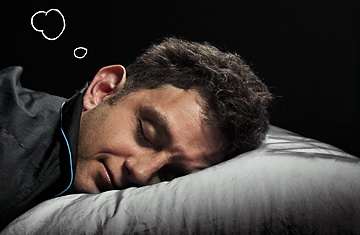
(2 of 4)
REM sleep begins about 90 minutes after the first NREM cycle and is the true blue ocean of sleep. Heart rate and respiration accelerate, and brain activity, as measured by electroencephalograms (EEGs), increases too--a function of dreaming. For this reason, the muscles become paralyzed, lest you act out the scenes unspooling in your head. Know those dreams in which you're trying to run away from something but can't seem to move your legs? That's no illusion.
Most REM sleep comes in the last four hours of sleep, says cognitive neuroscientist Jessica Payne of Notre Dame University. "Dreams in the early, NREM phase can be kind of literal. It's in the REM phase that you get all these crazy binding errors--you dream that you're walking in New York and suddenly wind up in Paris."
Binding errors is one of those lovely scientific terms that means pretty much what it sounds like. Your waking brain is orderly, your sleeping brain is fragmented, and as with all broken things, the bits can get reassembled the wrong way. But "the wrong way" suggests that there's just one way, and the genius of sleep is that it allows you to explore other, untried avenues.
In a frequently cited 2009 study, investigators at UCLA and the University of California at San Diego recruited a group of volunteers and had them solve a type of word puzzle known as the remote-association test (RAT). In a typical RAT question, subjects are given three words and asked to determine a fourth word that links them all. The answer for the words broken, clear and eye, for example, would be glass. The volunteers had to take the test twice; between the two sessions, they were told to take a 40-min. nap. Some just rested in that interval, others dozed, and some tumbled into the depths of REM sleep. On Round 2 of the tests, participants who got a slug of REM improved 40%, while the other volunteers saw their scores go down. Sleep, it appeared, sharpened the brain's ability to find links among words that it otherwise wouldn't have found.
A 2004 study from Germany's University of Lbeck came at the same idea in a more revealing way. Subjects were required to complete a series of tedious math problems that relied on cumbersome algorithms, but hidden deep within the formulas was an elegant arithmetical shortcut. About 25% of the subjects discovered it on their own. But that figure jumped to 59% when volunteers were given a chance to get eight hours of sleep and then come back for more. Subjects who spent the same eight hours awake showed no such improvement.
"If you have an idea about a simpler solution and it's been working itself out in your head, you still tend to use the familiar one," says cognitive neuroscientist Howard Nusbaum of the University of Chicago. When you sleep, the better answer has a chance to emerge.
The Hard Drive in Your Head
